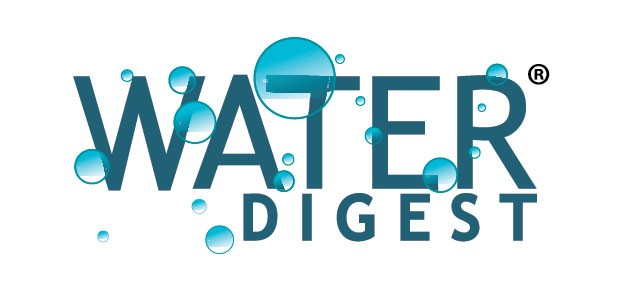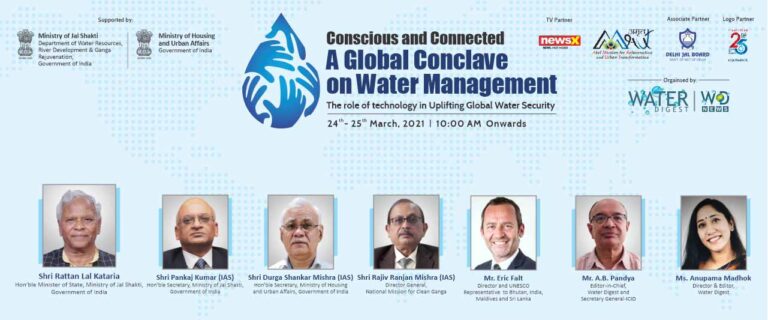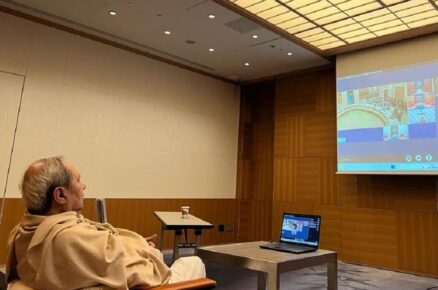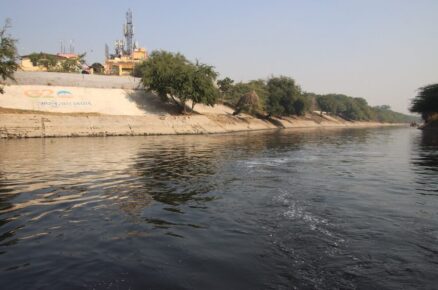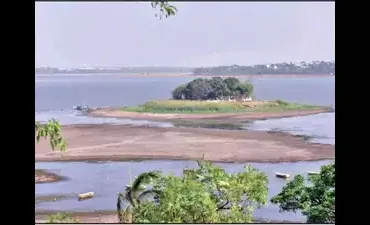In continuation of the World Water Day celebrations, Water Digest organised a two-day online Water Digest Global Conclave 2021 titled “Conscious and Connected: A Global Conclave on Water Management – The Role of Technology in Uplifting Global Water Security” on March 24-25, 2021. The event was held in partnership with UNESCO and was supported by the Department of Water Resources, River Development and Ganga Rejuvenation, Ministry of Jal Shakti, Ministry of Housing and Urban Affairs, Government of India and AMRUT. Partners for the event were Delhi Jal Board and Electrosteel Castings Limited.
The conclave received an overwhelming response from professionals and leaders connected with the water sector from all across the globe.
The global conclave focused on achieving Sustainable Development Goals (SDGs), with emphasis on SDG 6. It was in keeping with the theme of World Water Day “Valuing Water” where diverse perspectives were presented by various esteemed personalities who elucidated on the cultural, social, environmental and economic aspects of water.
Well-known experts from a broad spectrum were a part of the conclave. Among them were Shri Rattan Lal Kataria, Minister of State, Ministry of Jal Shakti, Government of India, Shri Pankaj Kumar (IAS) Secretary, Ministry of Jal Shakti, Government of India, Shri Durga Shankar Mishra (IAS), Secretary, Ministry of Housing and Urban Affairs, Government of India, Shri Rajiv Ranjan Mishra (IAS), Director General, National Mission for Clean Ganga, Mr. Eric Falt, Director and UNESCO representative to Bhutan, India, Maldives and Sri Lanka, Shri Shalabh Kumar, Member Water Supply, Delhi Jal Board and Shri A.B. Pandya, Editor-in-Chief, Water Digest and Secretary-General-ICID.
Ms Anupama Madhok, Director and Editor, Water Digest, in her welcome address, spoke about the importance of World Water Day and SDG 6 goals. She also mentioned that like all previous endeavours of Water Digest, this Global Conclave is aimed at uplifting the importance of water in people’s lives to encourage, promote and nurture the values that would help all of us to strive towards global water security.
Ms Madhok highlighted how the attention the water sector has received from the global community has infused a sense of responsibility among the government, industry insiders and stakeholders.
In his pre-recorded message, Shri A.B. Pandya, Editor-in-Chief, Water Digest, said, “Better technology innovations play a vital role in every aspect of water management. In developed countries, water infrastructure also adds an economical value.”
In an attempt to overcome this crisis, he suggested that SDG goals be designed to provide safe and affordable drinking water for all by 2030. “This goal requires investment of inadequate infrastructure, sanitation facilities, and hygiene measures. Protecting and restoring water-related ecosystems is essential,” he said.
Addressing the dignitaries via a recorded message, Shri Rattan Lal Kataria said, “The importance of water is beyond everything.It plays a crucial role not only in the irrigation sector but also the industries. It’s our responsibility to protect our natural resources in a significant manner.”
Dwelling on the problems being faced in saving water in our rivers, ecosystems, lakes etc., he said,“if we don’t not take it seriously now, our future generation will definitely suffer”.
In his address, Shri Pankaj Kumar (IAS) said, “Water is a very precious resource and its availability is declining over a decade in many parts of the world including India, therefore it’s a need to act on water resource issues at all levels including the local level.”
“Everything is developed around water. We cannot live without it. Water as an infrastructure, is being given a lot of importance in India due to the efforts of our Prime Minister,” said Shri Durga Shankar Mishra (IAS) via a recorded video message,
Shri Rajiv Ranjan Mishra (IAS), said, “Technology playsan important role in various aspects of water and wastewater management.So, bringing the right kind of technology and the exchange of ideas is very important to manage available water resources and wastewater reuse and recycle.”
Sharing his concern about safe drinking water and sanitation, Mr. Eric Falt said these are basic human rights and presently the ratio is only one-third. “The value of water is important in every aspect of water management,” he said.
Shri Shalabh Kumar spoke about the fundamental duty of conserving water just as the fundamental right to life extends to the right to access water.”Water nurtures life, it teaches us to be fluid and flexible. Just as we’re not supposed to take a person for granted, we mustn’t be flippant towards how we consume this precious, limited resource,” he said.
The first session revolved around the theme of “Advocating Policies Directed Towards Sustainable Water Management to Achieve SDG 6”.

(L to R): Shri G. Asok Kumar, Additional Secretary & Mission Director, National Water Mission, Shri Prabhat Kumar Mishra IAS, Principal Secretary GoWB and Project Director WBADMIP, Government of West Bengal, Mr Shalabh Kumar, Member Water Supply, Delhi Jal Board and Ms Anupama Madhok, Director & Editor, Water Digest
The panelists, Shri G. Asok Kumar, Additional Secretary & Mission Director, National Water Mission and Mr. Prabhat Kumar Mishra IAS, Principal Secretary Government of West Bengal (GoWB)and Project Director WBADMIP, (GoWB) shared their expertise, experiences and suggestions.The discussion was moderated by Ms. Anupama Madhok, Director& Editor, Water Digest.
Shri G. Asok Kumar, shed light on the NWM goal focusing on the increase of water use efficiency by 20%. This also plays an important role in achieving SDG 6.4 by 2030, which aims to substantially increase the water-use efficiency across all sectors and ensure sustainable withdrawals and supply of freshwater.
He also spoke about the existing policies and their impact on the irrigation system that may help to achieve efficient irrigation in order to consume less freshwater.
Talking about the important parameters that need to be taken into account while implementing technology for water management in the Indian context, Shri Prabhat Kumar Mishra (IAS), said technological tools are useful for water conservation, its management and impact assessment of irrigation structures.
The second panel for discussions involved Dr. Ramnath Sonawane, Secretary, Maharashtra Water Resources Regulatory Authority, Shri M.P Raval, Special Secretary (Sau. Region), Narmada Water Resources Water Supply and Kalpsar Department, Government of Gujarat and Dr. Srinivas Chokkakula, MoJS (Ministry of Jal Shakti) Research Chair – Water Conflicts and Governance, Centre of Policy Research. Mr. Victor Shinde Sector-Coordinator- Water & Environment, the National Institute of Urban Affairs, India, moderated the discussion.

(L to R): Mr. Divyang Waghela, Head – Tata Water Mission (TWM), Prof. Dr Shyama V. Ramani, Professorial Fellow, UNU-MERIT, Maastricht (NL), Mr. Vinod Kumar N, Director Trade & Investment, Austrade India and Ms Neha Midha, National Programme Officer, Natural Sciences, UNESCO
Dr. Shyama V. Ramani brought up the subject of data management for the framing and implementation of the water policy since we live in a world of data-driven strategy and policymaking.Failure in data management can put all the efforts on the backfoot, she warned.
Shri Divyang Waghela shared his views on the challenges being faced while implementing policies and projects at the ground level.
Mr. Vinod Kumar N shared the Australian stand-in addressing the SDG 6, especially the facets of safe drinking water and irrigation. Day one of the conclave was both informative and enlightening for everyone.
The trend continued on the second day (March 25) with the session on the theme of “Advocating Policies Directed Towards Sustainable Water Management to Achieve SDG 6.” All the panelists shared their expertise, experiences, and suggestions.
The first panel had Shri Amrut M. Makwana, Addl. City Engineer (Water Works), Exe. Engineer (Water Supply), Vadodara Municipal Corporation, Shri Ravindra Desai, Director (Operations), Govt. and Corporate Relationship, Art of Living’s River Rejuvenation Projects and Shri Rajneesh Chopra, Global Head – Business Development, VA TECH WABAG Ltd.

(L to R): Mr. Anshuman, Associate Director-Water Resources Divison, TERI, Mr Vishwanath S., Rain Water Club, Bangalore, Karnataka, Mr Sabarna Roy, Senior Vice President (Business Development), Electrosteel Castings Limited- technological invention and Mr Victor Shinde, Sector-Coordinator- Water & Environment, National Institute of Urban Affairs, India
Shri Anshuman gave a brief about the notable achievements of the previous water policy. He also suggested some new thrust areas that this policy must focus on.
The Prime Minister’s initiative, Jal Shakti Abhiyaan-2, also called “Catch the Rain” lays emphasis on rainwater harvesting and reviving water bodies. Shri Vishwanath S., spoke about the kind of enabling environment needed to secure a buy-in from stakeholders for making such an endeavour a citizens’ movement.
Shri Sabarna Royspoke about the key thrust areas for water management in India, reuse of wastewater and major challenges in this regard.
The panel for the last discussion included Shir Kunal Shah, Managing Director – Sales, Asia Pacific, Anaergia Singapore, Mr. Niv Pintow, Mekorot Project Manager-India, Israel National Water Co.and Ms Praveena Sridhar, Operations Lead- Karnataka, Cauvery Calling Initiative, Rally for Rivers.The discussion was moderated by Ms Anupama Madhok, Director and Editor, Water Digest.

(L to R): Mr. Kunal Shah, Managing Director – Sales, Asia Pacific, Anaergia Singapore, Mr. Niv Pintow, Mekorot Project Manager-India, Israel National Water Co., Ms Praveena Sridhar, Operations Lead- Karnataka, Cauvery Calling Initiative, Rally for Rivers and Ms. Anupama Madhok, Director & Editor, Water Digest
Shri Kunal Shah, Managing Director, Asia Pacific at Anaergia spoke about how wastewater management promotes the virtues of valuing water and the role of technology and infrastructure in developing efficient wastewater projects.
Mr. Niv Pintow, Mekorot Project Manager-India, Israel National Water Co. shared the success story of the exceptional wastewater management practice in Israel.
Ms Praveena Sridhar, Operations Lead- Karnataka, Cauvery Calling Initiative, Rally for Riversspoke about how even our culture encourages the importance of its judicious use and management. She also spoke about the need to connect with people living in remote areas, who lack knowledge about water related issues.
The event was also streamed live on the official Facebook handles of Water Digest, Ministry of Jal Shakti, CWC, NMCG, CGWB, WAPCOS Ltd, NWM and other partnering organisations..
